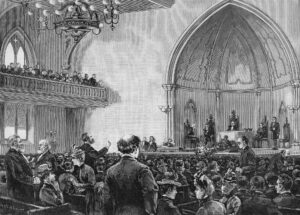One of the most influential recent books on pastoral ministry is Dangerous Calling by Paul Tripp. Published back in 2012, I have read it multiple times and have been impacted by Tripp’s plea for pastoral faithfulness in the midst of a uniquely challenging vocation.
Some time ago, I picked up my copy and something caught my attention on the back. The book was endorsed by five well-known Christian leaders, and of those five, three have since left the ministry. I won’t mention any names, but I will say that two were disqualified from ministry, and one has renounced Christianity altogether. The sad irony is that it only bolsters Tripp’s contention that pastoral ministry is indeed a dangerous calling.
Just to clarify, if you have a copy of the book, more than likely your copy isn’t endorsed by these three fallen leaders. I have one of the first editions of the book and the publisher has updated it for obvious reasons so as not to include them.
In his classic work, Lectures to My Students, Charles Spurgeon writes, “Do not enter the ministry if you can help it.” …If any student in this room could be content to be a newspaper editor, or a grocer, or a farmer, or a doctor, or a lawyer, or a senator, or a king, in the name of heaven and earth let him go his way” (26-27).
Ministry is hard! Perhaps you have come through a particularly difficult season of ministry, and you are asking, ‘will I last in ministry?’ If you are, you are certainly not alone.
While perhaps Spurgeon goes too far in stating this, few would miss the wisdom of his words. Ministry is not just one out of a smorgasbord of job options to choose from. If a man is not truly called of the Lord and He doesn’t feel utterly compelled to shepherd the flock of God (1 Peter 5:1-4), then it is sound advice to find another calling.
I have only been a pastor for about 14 years, but I can think of several friends and acquaintances who have left the ministry during that time. Some should not have entered ministry in the first place, but not everyone who leaves the ministry is a failure.
For one of those friends, stepping aside from pastoral ministry was the last thing he wanted to do. Even though God opened the door for him to take a government job with a much higher salary, he wrestled mightily with this transition.
Ministry is hard! Perhaps you have come through a particularly difficult season of ministry, and you are asking, “will I last in ministry?” If you are, you are certainly not alone.
I recently read David Murray’s book “Reset” and found it to be filled with much practical wisdom, particularly when it comes to taking care of your physical and emotional health. I would heartily commend it, but one of the things I wish Murray had emphasized more was that of personal holiness.
When a pastor is not actively pursuing sanctification and godliness in his own life, it greatly hinders his ability to shepherd God’s flock. When a pastor fails to keep watch over his soul, it matters little how well he cares for his own physical health. Paul instructed Timothy to “Keep a close watch on yourself and on the teaching. Persist in this, for by so doing you will save both yourself and your hearers” (1 Timothy 4:16).
Later on, in that same letter, after exhorting Timothy on the dangers of the love of money, he writes, “But as for you, O man of God, flee these things. Pursue righteousness, godliness, faith, love, steadfastness, gentleness. Fight the good fight of the faith” (1 Timothy 6:11-12).
We need to get serious about sanctification! One of the best ways that all Christians, not just gospel ministers, can battle Satan and “fight the good fight” is through holy living. Robert Murray McCheyne once said, “my people’s greatest need is my personal holiness.” This word is especially relevant to pastors and leaders in the 21st century. Every pastor must deal with unique challenges and pressures, and the tendency is to elevate something else (managing, counselling, networking, visiting, and even preaching) in the place of pursuing holiness.
In recent years, we have witnessed the fall of several high-profile Christian leaders. To that we can add many more “ordinary” leaders who have also fallen, but done so under the radar. While each situation is different, I would argue that the vast majority of these leaders gave the enemy a foothold by letting their walk with the Lord slide.
God has called every pastor, first and foremost, to be a worshipper of Jesus (Psalm 32:11)! That is the calling of every Christian, of course, but pastors are called to “set the believers an example in speech, in conduct, in love, in faith, in purity” (1 Timothy 4:12).
Christian leader, how much time are you spending in daily prayer? How much time do you spend in Bible and devotional reading, not related to teaching and preaching? How actively are you pursuing the spiritual disciplines and a greater level of intimacy with Jesus? When we let these practices slip, it greatly hinders our ability to shepherd and care for the flock God has entrusted to us.
Indeed, pastoral ministry is a “dangerous calling.” It takes years to foster a healthy ministry lifestyle and habits, but it only takes a misstep here or there, to be disqualified. The battle is raging (Ephesians 6:10-18), Satan is real (2 Corinthians 11:14), and the salvation of souls is at stake (2 Corinthians 12:15).
Every pastor and Christian leader wants to endure in ministry and go the distance. However, if we neglect the all-important aspect of holiness, and fail to live lives in keeping with our profession, it will eventually comprise our longevity, not to mention our effectiveness.
The words of Hebrews 12:14 offer a sober warning for every believer. “Strive for peace with everyone, and for the holiness without which no one will see the Lord.”
Holiness is not optional. May we, as pastors, strive for holiness and exhort our people to do the same!
Originally published here and used with permission.
























